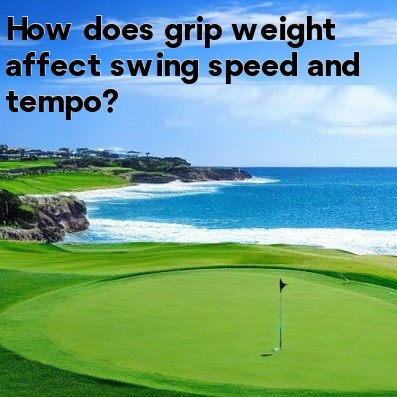
Grip Weight and its Impact on Swing Speed and Tempo in Golf
When it comes to improving performance in golf, every detail matters – even the weight of your grip. The grip weight of a golf club can have a significant impact on swing speed and tempo, ultimately influencing the overall effectiveness of your shots. Let's explore how grip weight affects these crucial aspects of your golf swing.
Swing Speed
Swing speed refers to the velocity at which the clubhead travels during your swing. It directly affects the distance the ball travels on the course. While various factors can influence swing speed, grip weight plays a key role in determining how quickly you can swing the club. A lighter grip weight leads to increased swing speed because it allows for greater clubhead acceleration.
With a lighter grip, it becomes easier to generate speed throughout the swing, resulting in a faster clubhead at impact. This increased speed can translate into longer shots, particularly off the tee or with fairway woods. However, it's important to find the right balance of grip weight to ensure control and accuracy aren't compromised.
Tempo
Tempo refers to the rhythm and timing of your golf swing. It's often described as the cadence or the smoothness of your swing. Achieving the ideal tempo can lead to improved consistency and ball striking. The grip weight of your club can influence your tempo by affecting the overall feel of the swing.
A heavier grip weight tends to promote a smoother and slower tempo. This weight helps golfers maintain better control and stability throughout the swing by minimizing excessive hand and wrist movements. The added weight provides a sense of stability, allowing golfers to maintain a consistent rhythm and tempo. This can be especially beneficial for players who struggle with swings that are too fast or inconsistent.
Conversely, a lighter grip weight can result in a faster tempo. The reduced weight allows for quicker transition and less resistance, which can lead to a more aggressive swing. This can be advantageous for players who naturally have a slower tempo or are looking to increase their overall clubhead speed.
Finding the Right Balance
As with many aspects of golf, finding the optimal grip weight is a matter of personal preference and experimentation. It's crucial to strike a balance that suits your individual swing characteristics and goals. Golfers have differing opinions and preferences when it comes to grip weight – some prefer a slight change, while others may opt for a more significant adjustment.
The best way to determine the ideal grip weight for you is through trial and error. Test different grip weights on the driving range and pay close attention to how it affects your swing speed and tempo. Take note of any changes in distance, control, and overall feel with different grips.
- Start by trying a slightly lighter grip weight to see if it helps increase your swing speed without sacrificing control.
- If your tempo feels off or your shots become more erratic, experiment with a slightly heavier grip weight to stabilize your swing.
- Consult with a professional club fitter or golf instructor who can provide guidance based on your swing characteristics and goals.
In conclusion, grip weight has a noticeable impact on swing speed and tempo in golf. Finding the right grip weight for you can enhance your performance on the course by maximizing distance, control, and consistency. Whether you prefer a lighter or heavier grip, keep experimenting to find the balance that optimizes your swing.





